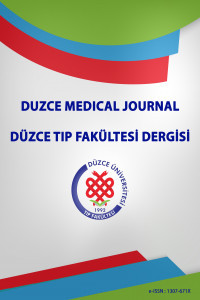EDTA’lı tam kan örneklerinden otomatik DNA izolasyonu: Manuel DNA izolasyonu ile karşılaştırma
Son zamanlarda klinik laboratuarlarda PCR-tabanlı moleküler tekniklerin kullanımı artmıştır. Bununla birlikte, bu tekniklerden yararlanabilmenin ön şartı, hızlı ve verimli DNA izolasyon yöntemlerine gereksinim duyulmasıdır. Bu amaçla manyetik bilye teknolojisini kullanan otomatik DNA izolasyon sistemleri geliştirilmiştir. Ancak manyetik partiküller elüsyon aşamasında DNA çözeltisinden yeterince uzaklaştırılamazsa, bu manyetik bilyeler amplifikasyon reaksiyonunu bozabilmektedir. Bu durum da PCR sensitivitesini azaltmakta veya yalancı negatif PCR sonuçlarına yol açmaktadır. Bu çalışmanın amacı manyetik bilye teknolojisini kullanan bir otomatik DNA izolasyon cihazıyla elde edilen DNA’ların saflık, verimlilik ve PCR-hibridizasyon performanslarını değerlendirmek ve manuel izolasyon yöntemiyle karşılaştırmaktır. EDTA’lı tam kan örneklerinden otomatik DNA izolasyon sistemiyle (QuadroProbe QP10) elde edilen DNA konsantrasyonları 28 – 74 ng/l aralığında ve A260/A280 oranı ortalama 2.5 ± 0.73 idi. PCR-hibridizasyon işlemlerinden elde edilen sonuçlar gösterdi ki QuadroProbe QP10 ile izole edilen DNA çözeltisi, PCR-hibridizasyon reaksiyonlarını inhibe edebilecek herhangi bir materyal içermemektedir. PCR laboratuarlarında EDTA’lı tam kan örneklerinden yüksek kalitede DNA pürifikasyonu için QuadroProbe QP10 izolasyon cihazı kullanılabilir
Automated purification of DNA from EDTA-preserved whole-blood samples: Comparison with manual DNA extraction
In recent years, the use of PCR-based molecular techniques in the clinical laboratories has increased. For this purpose, automated DNA isolation instruments using magnetic bead technology have been developed. However, if magnetic particles are not removed sufficiently from DNA solution, amplification reactions will be inhibited by the magnetic beads, which decrease PCR sensitivity or lead to false negative PCR results. The aim of this study was to evaluate PCR-hybridization performance, productivity and purity of genomic DNA extracted by the automated system based on magnetic separation technology, and to compare these results with those obtained with manual DNA isolation method. The yield of genomic DNA extracted by the automated system (QuadroProbe QP10) from human EDTA-preserved whole blood samples was 28 to 74 ng/l and the A260/A280 ratio was 2.5 ± 0.73. The results obtained from PCR-hybridization showed that the final solutions of DNA isolated by magnetic bead technology did not contain any inhibitory material for the PCR-hybridization reactions. These results show that QuadroProbe QP10 can be used for purification of good quality DNA from whole blood samples in PCR laboratories.
___
- 1. Grimberg J, Nawoschik S, Belluscio L, McKee R, Turck A, Eisenberg A: A simple and efficient non-organic procedure for the isolation of genomic DNA from blood. Nucleic Acids Res. 17: 8390, 1989.
- 2. Miller SA, Dykes DD, Polesky HF: A simple salting out procedure for extracting DNA from human nucleated cells. Nucleic Acids Res. 16: 1215, 1988.
- 3. Aljanabi SM, Martinez I: Universal and rapid salt-extraction of high quality genomic DNA for PCR-based techniques. Nucleic Acids Res. 25: 4692-4693, 1997.
- 4. Ciulla TA, Sklar RM, Hauser SL: A simple method for DNA purification from peripheral blood. Anal Biochem. 174: 485-488, 1988.
- 5. Bahl A, Pfenninger M: A rapid method of DNA isolation using laundry detergent. Nucleic Acids Res. 24: 1587-1588, 1996.
- 6. Kunkel LM, Smith KD, Boyer SH, Borgaonkar DS, Wachtel SS, Miller OJ, Breg WR, Jones HW, Rary JM: Analysis of human Y-chromosome-specific reiterated DNA in chromosome variants. Proc Natl Acad Sci U S A. 74: 1245-1249, 1977.
- 7. Planelles D, Llopis F, Puig N, Montoro JA: A new, fast, and simple DNA extraction method for HLA and VNTR genotyping by PCR amplification. J Clin Lab Anal. 10: 125-128, 1996.
- 8. Parzer S, Mannhalter C: A rapid method for the isolation of genomic DNA from citrated whole blood. Biochem J. 273: 229-231, 1991.
- 9. Berensmeier S: Magnetic particles for the separation and purification of nucleic acids. Appl Microbiol Biotechnol. 73: 495-504, 2006.
- 10. Spanova A, Horak D, Soudkova E, Rittich B: Magnetic hydrophilic methacrylate-based polymer microspheres designed for polymerase chain reactions applications. J Chromatogr B Analyt Technol Biomed Life Sci. 800: 27-32, 2004.
- 11. Leland J. Cseke, Peter B. Kaufman, Gopi K. Podila, Chung-Jui T: Handbook of Molecular and Cellular Methods in Biology and Medicine, pp: 1-24, CRC Press, New York, 2004.
- 12. Stormer M, Kleesiek K, Dreier J: High-volume extraction of nucleic acids by magnetic bead technology for ultrasensitive detection of bacteria in blood components. Clin Chem. 53: 104-110, 2007.
- 13. Beuselinck K, van Ranst M, van Eldere J: Automated extraction of viral-pathogen RNA and DNA for high-throughput quantitative real-time PCR. J Clin Microbiol. 43: 5541-5546, 2005.
- 14. Van Kuilenburg AB, Meinsma R, Zoetekouw L, Van Gennip AH: High prevalence of the IVS14 + 1G>A mutation in the dihydropyrimidine dehydrogenase gene of patients with severe 5-fluorouracil-associated toxicity. Pharmacogenetics. 12: 555-558, 2002.
- 15. van Kuilenburg AB, Muller EW, Haasjes J, Meinsma R, Zoetekouw L, Waterham HR, Baas F, Richel DJ, van Gennip AH: Lethal outcome of a patient with a complete dihydropyrimidine dehydrogenase (DPD) deficiency after administration of 5-fluorouracil: frequency of the common IVS14+1G>A mutation causing DPD deficiency. Clin Cancer Res. 7: 1149-1153, 2001.
- Yayın Aralığı: Yılda 3 Sayı
- Başlangıç: 1999
- Yayıncı: Düzce Üniversitesi Tıp Fakültesi
Sayıdaki Diğer Makaleler
A case of bardet biedl syndrome
Kubilay AR, Mustafa BAK, Hakan UZUN, Alev AKTAŞ
Damak yarığı olgularının tedavisinde glubran 2’nin kullanımı
Hayrettin ÖZTÜRK, Hatun DURAN, Hanifi OKUR, Hülya ÖZTÜRK
EDTA’lı tam kan örneklerinden otomatik DNA izolasyonu: Manuel DNA izolasyonu ile karşılaştırma
Hamdullah TURTHAN, Vefa YANMAZ, Abdülkadir YILDIRIM, Ebubekir BAKAN
Dirençli jeneralize status epileptikusun propofol ile tedavisi
Burcu ALTUNRENDE, Kazım KARAASLAN, Nebahat GÜLCÜ, Esra GÜMÜŞ
